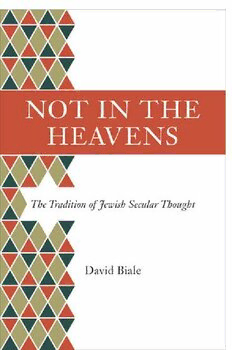Table Of ContentNot in the Heavens
Biale_Not-in-the-Heavens.indb 1 7/14/2010 9:26:21 AM
Biale_Not-in-the-Heavens.indb 2 7/14/2010 9:26:21 AM
Not in the Heavens
The Tradition of Jewish Secular Thought
David Biale
PRINCETON UNIVERSITY PRESS
PRINCETON AND OXFORD
Biale_Not-in-the-Heavens.indb 3 7/14/2010 9:26:21 AM
Copyright © 2011 by Princeton University Press
Published by Princeton University Press, 41 William Street, Princeton, New Jersey 08540
In the United Kingdom: Princeton University Press, 6 Oxford Street,
Woodstock, Oxfordshire OX20 1TW
press.princeton.edu
All Rights Reserved
Library of Congress Cataloging-in-Publication Data
Biale, David, 1949–
Not in the heavens : the tradition of Jewish secular thought / David Biale.
p. cm.
Includes bibliographical references and index.
ISBN 978-0-691-14723-9 (hardcover : alk. paper)
1. Judaism—History—Modern period, 1750- 2. Secularization (Theology)—
History of doctrines. 3. Judaism and secularism. 4. Secularism. 5. Jews—Cultural
assimilation. 6. Jews—Identity. I. Title.
BM195.B53 2011
296.3´7—dc22 2010006054
British Library Cataloging-in-Publication Data is available
This book has been composed in Janson Text
Printed on acid-free paper. ∞
Printed in the United States of America
1 3 5 7 9 10 8 6 4 2
Biale_Not-in-the-Heavens.indb 4 7/14/2010 9:26:21 AM
To the memory of my sister, Leah Korer, who chose a different path,
And for my children, Noam and Tali, who have inherited the legacy
Biale_Not-in-the-Heavens.indb 5 7/14/2010 9:26:21 AM
Biale_Not-in-the-Heavens.indb 6 7/14/2010 9:26:21 AM
Contents
Preface ix
Introduction: Origins 1
Chapter 1
God: Pantheists, Kabbalists, and Pagans 15
Chapter 2
Torah: The Secular Jewish Bible 59
Chapter 3
Israel: Race, Nation, or State 92
Chapter 4
Israel: History, Language, and Culture 135
Conclusion: God, Torah, and Israel 176
Epilogue: Legacy 181
Notes 195
Index 221
Biale_Not-in-the-Heavens.indb 7 7/14/2010 9:26:21 AM
Biale_Not-in-the-Heavens.indb 8 7/14/2010 9:26:22 AM
Preface
One of my father’s favorite memories of his mother—my grandmother—
was that she was the first Jewish woman in the Polish town of Włocławek
to grow her own hair. It was a small but significant rebellion. Since an-
cient times, the Jewish code of female modesty required married women to
cover their hair, either with a scarf or, for Eastern European Jews of means,
by a headdress encrusted with jewels, called in Yiddish a shterntikhl. In the
nineteenth century, a new fashion of wigs swept the Jewish world, splitting
the ultra-Orthodox, who denounced the new head coverings as “Gentile
wigs,” from the merely Orthodox, who believed that Jewish women were
still within the bounds of tradition with their heads covered by someone
else’s hair. By taking off this sheitel, my grandmother declared her indepen-
dence from a long-standing custom and thus, by a female gesture, heralded
the beginnings of secularism.
Her declaration was hardly born of a well-conceived ideology or of con-
scious intent to overthrow the religion of her ancestors. She, like my grand-
father, was in most respects a thoroughly Orthodox Jew, nominal followers
of a pietistic Hasidic sect. Yet, in the first decades of the twentieth century,
the winds of radical change began to blow through the ten-thousand-strong
Jewish community of Włocławek, some two hundred kilometers northwest
of Warsaw. Despite his Hasidic leanings, my grandfather joined the Miz-
rahi, the party of religious Jews who supported the Zionist movement. He
was also instrumental in creating a Hebrew gymnasium in the town. The
renaissance of the Hebrew language, so often associated with secular Zion-
ism, did not seem to him to contradict the dictates of the Jewish religion.
These halting gestures toward modernity left a deep impression on my
father. In the interwar period, when Polish Jews embraced a host of con-
flicting ideologies he, with his sister, joined Hashomer Hatzair, the Zionist
youth movement that espoused socialism and a romantic return to nature.
His younger brother gravitated in the opposite direction, also to Zionism
but instead to the Revisionist Betar, the hard-line nationalists who wore
military uniforms and rejected social revolution. Both movements, despite
Biale_Not-in-the-Heavens.indb 9 7/14/2010 9:26:22 AM

